Nuno Bettencourt: “I told the guys, ‘I wanna go for blood on this album.’ I wanted to make it fun with the guitar... to bring joy into it, to bring passion into it”
Bettencourt takes us behind the guitar album of 2023 and admits that, 15 years ago, he might have “fixed” the Rise solo and ruined it. Now, it's all about letting it rip – about making us all excited again
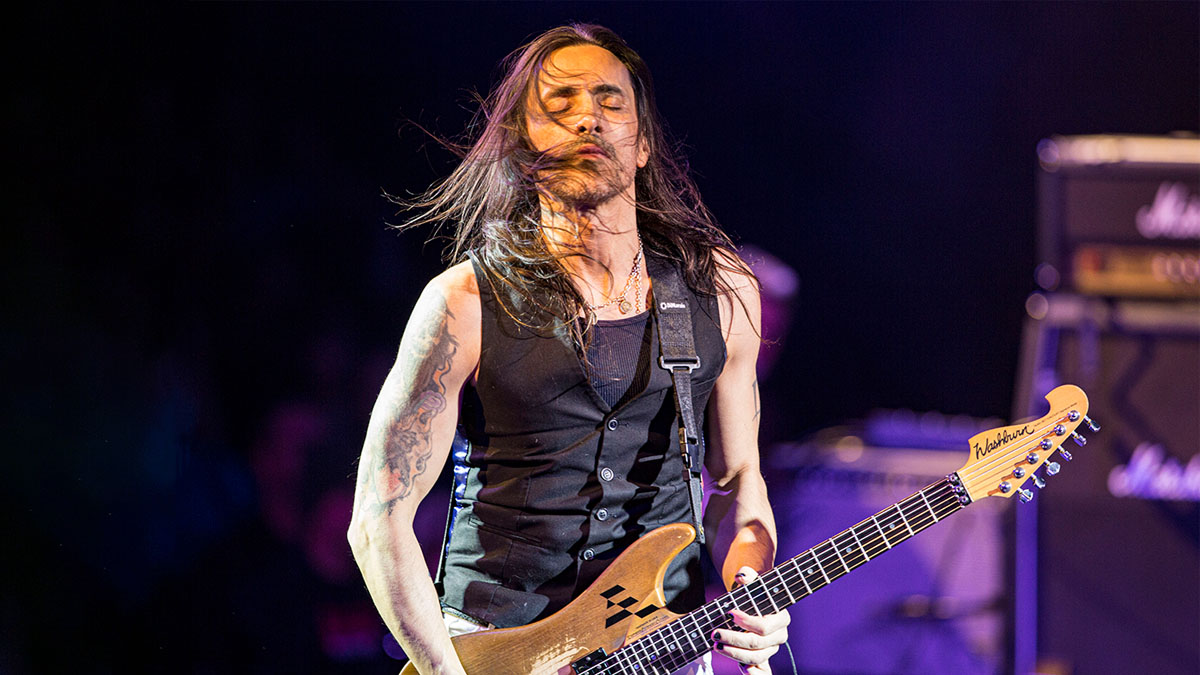
Nuno Bettencourt speaks fast when he is excited and right now he is speaking pretty fast. Everything is happening fast. After 15 long years, Boston rock institution Extreme has announced a new album, Six, and lead single Rise is blowing minds of players the world over with one of the most ridiculously entertaining guitar solos in recent memory.
It is the pop-cultural electric guitar moment of the year. Hands down. It’s the solo every aspiring shredder wants to play, the coruscating highlight of a track pitched in a drop-D hard-rock groove. The YouTubers have broken it down, Rick Beato has offered us his considerable insights, and yet its animal magic still seems elusive, a sleight of hand we’re all missing.
Rise has clocked up over 2.6 million views and counting since its debut on 3 March, surely sending similar numbers of players back to their practice spaces to workshop their game. There is a feeling that Bettencourt – one of the most kinetic and dynamic players of his generation – has just upped the ante again.
That was one of the animating principals behind Bettencourt’s approach to Six. As he explains, Six was all about throwing things down with energy, with commitment. The words fire and passion routinely crop up. The word “fuck” and variants thereof are used as punctuation and for emphasis.
The band have shared three tracks so far, #Rebel and Banshee supporting the theory that says, as guitar albums go, Six is as good as 2023 will get. But this being Extreme, the album is not all foot-to-the-floor hard rock.
There’s an elasticity to their sound, some flex that allows for the stylistic audacity of X Out, on which Bettencourt breaks out the 7-string guitar for the first time, or for the the summer pop of Beautiful Girls. There are the ballads, the anthems too. But of course, you know all this. Because as Bettencourt says, this is Extreme, and with Extreme you have got to “expect the unexpected.”
Expect the guitar spectacular, the intimate melodies; expect the sort of thing that no one else had thought of. Bettencourt, who produced the album, says he pushed his bandmates like never before. Gary Cherone's vocals have never sounded better. But everyone was pushed; Pat Badger on bass guitar, Kevin Figueiredo on drums. Bettencourt pushed himself.
Get the MusicRadar Newsletter
Want all the hottest music and gear news, reviews, deals, features and more, direct to your inbox? Sign up here.
Here Bettencourt discusses the making of Six, the philosophy behind his playing, the importance of performance, what people get wrong about a Marshall Dual Super Lead, and the things that make them tick as songwriters. But there's only one place a conversation about this album should start...
We have to talk about Rise, and the reaction to that song, and to that solo.
When was the last time we watched the guitar player in a video be that excited about playing a fucking solo?
“It is wild. The reaction itself. Look, egotistically, confidently, you always go into every album – Porno, III Sides, whatever – you always go into it with a passion and a fire that you believe that it should get some sort of response, right? Or else you wouldn’t do it. And you hope that people connect with it. But I have to say, at 56, and the band putting this album out now, 15 years of no music? Hell no we did not expect this response.
“It’s really exciting. It makes me kind of giddy. [Before] when you put something out you would have to wait months before if you knew people liked it or not. You would go to radio and wait to see if people liked it. You’d sell tickets to see if people wanted to come, and you would look at the charts. All that takes time. Now you release something and within 24 hours, 48 hours, they’ll tell you that they love you or you’re full of shit or whatever!”
That was a moment, a pop-cultural moment. Everyone was talking about it.
“Extreme getting a million views in 10 days, now at almost two million views since it has been out? Hell no did we expect that, and we are so thankful and grateful. Then I am getting hit up by peers, guitar players, people like Steve Lukather, or even Brian May, and getting responses that are not like ‘Hey buddy, good job. I love your new stuff!’ Like you’re supposed to say. Like we’re supposed to say to each other! [Laughs] This was different.
“These were, like, long text messages. ‘No, you don’t understand…’ And I started realising that, I believe, that the response has got to do with… it is a decent solo and it is a decent song. But more importantly, I think the response is coming from – and maybe people don’t know it – for the last eight, 10 years, the majority of really great guitar players, who even I follow, players I see who make my jaw drop, they are sitting in a room like this, y’know.”
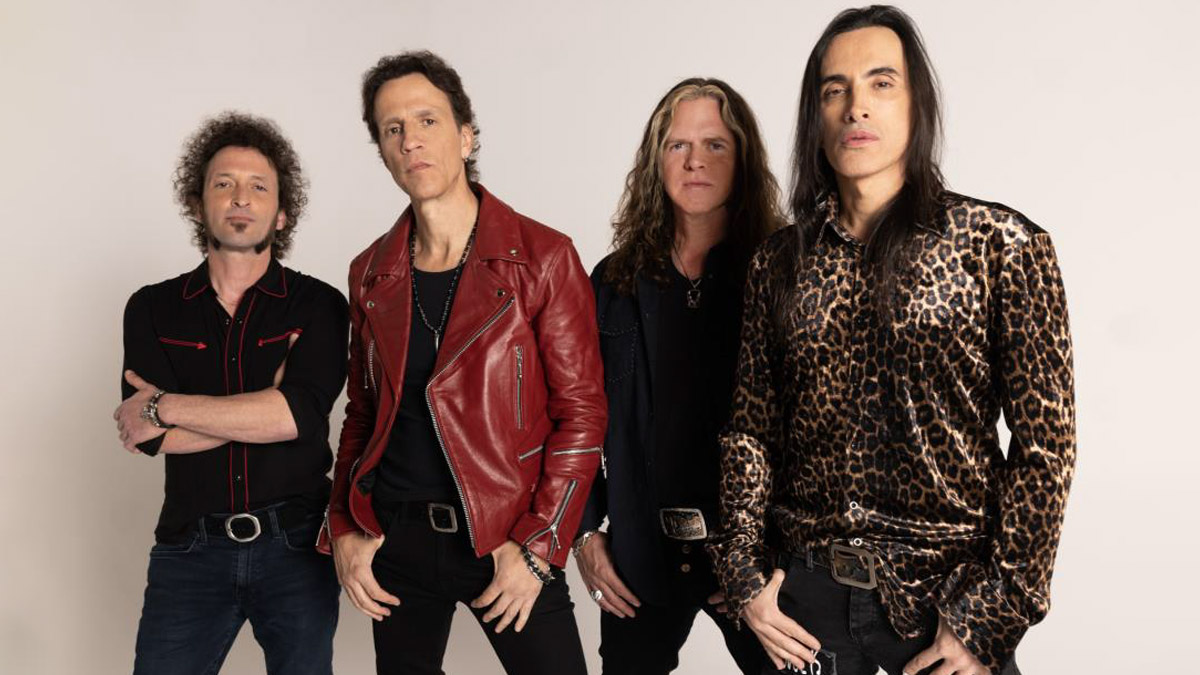
And you are on a stage. The energy is different.
“They’re sitting in their studios and they are making our jaws drop while playing guitar. Difference is, you have a band coming out, and there is someone playing guitar but it’s not just technical. It’s emotional. It’s physical. It’s watching somebody in a band, in the middle of a song, with harmonies and vocals and lyrics, and arrangements, and a bridge, and – by the way – all-in, passionately. That to me is the recipe for making people excited again.”
Because it is being performed. They are watching a performance.
“It’s not just the guitar playing, or the song. I remember somebody hit me up and the majority of texts I get are thank yous. They’re not like, ‘Oh this song’s amazing!’ It’s, ‘Thank you for fucking bringing us some rock ’n’ roll. Listening to a song, and getting excited, when was the last time we watched the guitar player in a video be that excited about playing a fucking solo? [Laughs] Or excited about performing a song! Or a singer that’s all in, character, like we have always been doing for the last 40 years onstage.
I am basically a frustrated drummer on guitar for the day. I started on drums. Drums are everything to me
“I think that is what’s exciting people. They might not even know it. They can say it’s the fucking guitar solo, and they can sit there and break the fucking thing down, but in my mind it’s this: if I did that sitting down, and I played you that same solo, people would be like, ‘Okay. Cool. He’s doing something interesting there.’ But it would have been so fucking boring, and so fucking, like, a lack of an event, because it is out of context.
“I don’t play like that. I play for a song, for the excitement of the song, and just, like you’ve heard the album, you’re gonna hear the Other Side Of The Rainbow, and people might not be as excited about that solo even though it is one of my favourites.”
The other point to make is that Rise is arguably not even the best solo on the album…
“I agree with you. I agree. First thing I said, the first thing I said when people said, ‘Oh my god!’ Whether its my peers, like Steve Vai, who said, ‘Is there other stuff on the record like this?’ I go, ‘No. And it’s not even the best solo.’ But you know what it is? It’s the best solo for the song.”
And it is a great solo.
“The bends at the beginning! There is a bend in one of the first three notes I play where I missed the whole string. I missed the whole fucking string. And I hit the next three strings, and it made a sound like, ‘Braaaaang!’ I couldn’t tell you what note it is doing because it is not a note.
“Fifteen years ago, I would have fixed that, like, ‘Let me redo that fucking note.’ But it hit something in me. I nailed it, meaning – woah! – it was sounding like a kick drum mixed with a couple of notes mixed with a car crash, and those are the things that touch people. What they are hearing and seeing is somebody who is saying, ‘Fuck it! Fire! Let’s fucking go!’”
It’s the texture of the notes, too. Those imperfections give us something to grab onto…
“Something to grab onto! And it’s passion. It gives you emotion.”
One of the great things about your guitar solos is you write them like a dance. They are danceable, and rhythmically physical.
“You’re right about that and right for one reason only; it’s because I am basically a frustrated drummer on guitar for the day. I started on drums. Drums are everything to me. Every time someone gets me to jam they fucking hate me because I’ll be be like, ‘Yeah, I’ll play drums if you want!’ But that is everything on my instrument. I play percussively.
“Even when I play a solo it’s a rhythm to me, and it’s got a feel and a bounce. I feel like it I play it like another level of rhythm guitar on top of rhythm guitar. [Laughs] You know what I mean!? It’s like I drummed the whole thing out and you could write out all the patterns – not on purpose. Not on purpose, but even when I bend the note at the beginning of Rise, believe me, there is a flow that I don’t even realise until afterwards that is rhythmic and waltzy and all sorts of stuff is going on.”
Because there is a rhythm to the bends as well. Extreme has always had this quality where you can have an ‘80s vibe, a ‘90s vibe, whatever, and also be so present. And you have this dynamic where you can play so heavy, and yet you can bring it right down to tracks like Small Town Beautiful. Have you sold that one to a movie yet?
“It needs to be, right? There is a lot of cinematic tracks on this album that could belong on some sort of soundtrack to a movie. Every time that I have written a song – and this is no bullshit – while I am writing it, whether it is pen and paper or I am on my computer, that is the first thing I do in the moment. I see things. I see the visuals they bring out, and I literally write that next to it, like what a possible visual is, what a possible video is, what I am seeing, and what is the emotion of it?
“Once you see The Other Side Of The Rainbow video that we shot, it is so ‘other side of the rainbow’ [laughs] in terms of the location. For us, the location is aways a character, just like Rise was. There were no lights. There was just that cross. It was just us being raw like the song was, and it was about the rise and fall of fame, and that’s all it was.”
You talked explicitly about upping the game for guitar. Did you try out new techniques for this album? Are you on the edge of your ability when writing this?
“It’s interesting, because from a guitar perspective I was telling one of my guitar player friends how the guitar itself, you have a relationship with it, like a person. It’s not just a block of wood that you pick up and put down. Sometimes you are excited to hang with that friend, and sometimes you’re not.
“Sometimes you go away for a while but like an old friend that you trust, and everybody has those one or two friends that no matter what, you might not see them for one or two years but when you pick up and have lunch with them it’s like you never left, and you have this bond and this understanding.
“I always looked at guitar that way. It is okay to walk away for while, that you need a break from somebody for a while. And sometimes you are obsessed, and you hang out for six months straight, and that is how it is [now].”
And you have to make the most of it when you’re in that zone.
“I think we hit a period on this album where I was like, ‘We’re good’. Doing the Generation Axe Tour inspired me a little bit, too, I have to say. Playing with all these amazing guitar players and heroes lit my fire a little bit again. Even as I was doing the album and Edward [Van Halen] coming to my house and almost listening to the album.
The great bands that we love, the Queens of this world, they still wrote simple rock songs, but there was a complexity if you wanted to look deeper
“He was outside at one point and I was like, ‘Oh my god I want to play him it back.’ And then he passed away and never had the chance. All those things. Even him passing away. It gave me this sense of responsibility and fire, like, ‘Fuck, man! There’s not a lot of people left in this generation of people who I work with.’
“There are a lot of great guitar players but not so much that we are in a band and write songs, and play the solo within a song, and got creative within the tone of a song, and I almost felt this responsibility to fucking carry that torch.
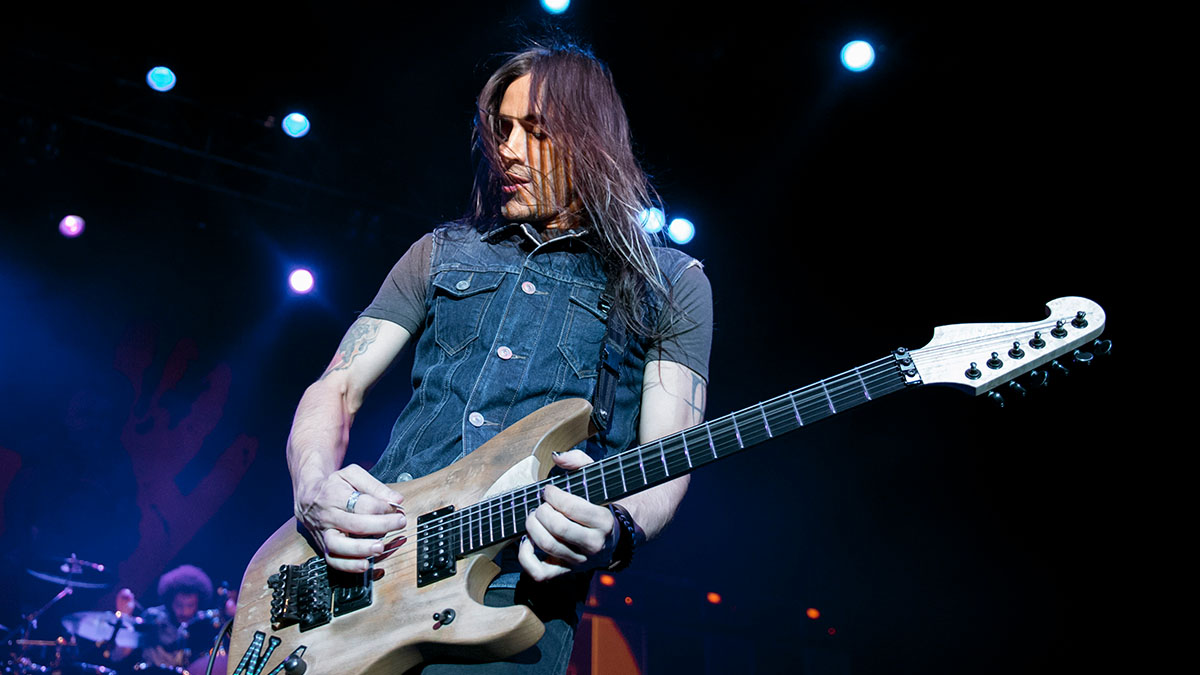
“I told the guys, ‘I wanna go for blood on this album, in the sense of I want to make it fun, and I want to make it fun with the guitar, so that there are things within the rhythm playing. To bring joy into it, to bring passion into it, is what I have always done in the past, and it comes from that Edward Van Halen school, and Brian May and Jimmy Page.
“They just got creative, even when they were playing rhythm, and there were sections, and chordal things underneath. We’re not doing jazz, right? We’re still doing rock ’n’ roll, and it’s still a three-and-a-half-minute song, and songs are supposed to be simple, but there’s nothing wrong with the genius of doing stuff. The great bands that we love, the Queens of this world, they still wrote simple rock songs, but there was a complexity if you wanted to look deeper.”
There were layers.
“There were layers that you could peel back, and things that you could discover, so what I call it is ‘simplexity’, y’know!? [Laughs] It’s the search for simplexity in a song Someone cracked me up the other day, a guitar player was doing one of those things where they break it down and they listen to song, and they react – it’s all these reaction videos now! – and one guitar player cracked me up.
“I was crying in tears. He was like, ‘The chorus comes in, and where have I heard this before?’ And he cuts to a Kesha song, and she’s doing this yodelling thing! I fell off my fucking seat! He nailed it. It is exactly what it is. Not that I took it from there but holy fuck it is a Kesha fucking hook. I couldn’t believe it. It is [all] pop, man.”
We can over-intellectualise the whole enterprise.
“Everyone likes to think that rock ’n’ roll and rock bands, that we’re so fucking intricate, and we’re so fucking intellectual, whatever it is, I’m sorry, we’re writing fucking nursery rhymes for adults at the end of the day. That’s what we are doing. And we all sing along with it, and it’s anthems.
“What’s the difference from ‘The wheels on the bus go round and round’ to ‘Oh-woah-oh!’? It’s all the same shit, but it’s just the lyrics and the melodies are just a little more for grown-ups. But! If you wanna have some poetry, if you wanna have some shit that you want to do on guitar, and you want to go at the borders of this Simple Mountain to this Simplexity world, you can!
They f**king hate the song Creep but that song changed my life because it was the epitome of simplexity
“Radiohead does it as a fucking art form. Y’know, they are singing these things, and it’s droney, and it’s nothing complex – it’s not jazz – but man, there are some lyrics, and some melodies, and some fuckin’ weird harmonies, and production, and still, okay, we call it alternative because it is a little smarter. I got you. But at the end of the day, come on!
“They fucking hate the song Creep but that song changed my life because it was the epitome of simplexity. The lyrics on Creep blew my head wide open and it changed my life. And the fuckin’ angst of the song!? Kuh-chung! And the fuckin’ angst of the guitar! It changed the game for me, and then I don’t think they even like playing the song live. They hate the fucking song. But it is a work of art to me because it is the epitome of simplexity.”
You have always been quite subversive in that sense in being able to give us all these big ideas within the context of a pop and rock song. You have loads of songs that can soundtrack Friday night with beers, then on Monday morning with headphones you can pick out all these details.
“You’re absolutely right. Music is mood. Even to the point of, technically speaking, when you get up in the morning your heart rate is so much fresher, and so much going on, and you want to get going in your day, that when I listen to those same songs that we’ve worked on, picking a tempo is a nightmare for me.
“A tempo? Okay, we’ve got the song, but what is the fucking tempo of the song!? And I am talking two clicks faster, two clicks slower, it can change the whole motherfucking thing. The feel of it, the riff. It changes.”
These are big decisions and they’re not easy.
“The reason this is so hard is because you are in the studio and your heart rate changes, and your perception of what you hear when you write the song, like Rise, with the [hums riff] changes.
“When we write that, I think, ‘Oh my God. This feels good. It’s three o’clock in the afternoon and this feels good.’ By the time I’m fucking exhausted at 11, or one in the morning, the songs all [frantic]. Like, ‘Oh my God! I fucked it all up. We fucked it all up. We gotta recut everything; it’s too fucking fast!’ And I’m like, ‘Let’s listen to it in the morning.’ I’ll come in and it’s like [hums riff]. It's okay. What the fuck is going on?
Your frame of mind, your heart rate, your adrenaline, when it changes, you hear songs differently
“Your frame of mind, your heart rate, your adrenaline, when it changes, you hear songs differently. You go to a show and it’s like, ‘What the fuck? Is this band flying right now?’ It's because they are so excited. I’ve seen Prince and Michael Jackson songs I don’t even recognise [hums Wanna Be Startin' Somethin’]. What happened? You can’t even dance to it. In his head, it is [as recorded].
“We recorded Extreme shows just to see that. We played the first four songs so fucking fast, and when we asked Kevin to do a click so we could control it, we were like, ‘Oh my fucking God. Decadence [Dance] is like…’ It’s wild. You’re right. You’ve got to find the push and pull with what you want to do. The mood is huge. We try to get it into a place where you can listen to it at all times. [Laughs]”
What are you like as a producer? What’s your approach? What did you learn when you worked with the likes of Michael Wagener?
“Well, let’s get one thing fucking straight, I produced all of those albums. I love Michael Wagener, and the reason I worked with Michael Wagener was because I loved his production, so we went out to him. But the reason I ended up hiring him is because he came back after he heard the demos that we had – which actually weren’t demos, they were the album – he told the label, ‘Wow! This is fucking great. I’ll do it. But what do they need me for?’
“I said, ‘Hire him!’ Because, you know why? He was somebody that recognised all the work that I was doing, how important it was to the songs and the arrangements. He recognised that. He wasn’t in the studio when we recorded Pornograffitti. Eighty per cent of Pornograffiti was done before we went to LA.
A good producer like Michael Wagener knows when to do 99 per cent and knows when to do one per cent. That’s why he was genius during Pornograffitti... he knew when you’ve got to get out of the f**king way
“A good producer like Michael Wagener knows when to do 99 per cent and knows when to do one per cent. That’s why he was genius during Pornograffitti, not because he let me do my thing, but because he knew when you’ve got to get out of the fucking way of what someone is doing.”
Recognising that is the talent.
“Butch Vig! I saw this article where he was about to do Smells Like Teen Spirit, he is about to do Nevermind, and he says they sent him a cassette from a boom-box in rehearsal and he got it sent, and he panicked, because it was already there. ‘How the fuck do I get out of the way of that?’ And that’s a good producer. That’s a good producer, getting scared and thinking, ‘Oh my God. This is good. How do I recapture this?’ And not going, ‘Well I’m going to put my fucking stamp on it’ or whatever.
“What am I like as a producer? [Six] is probably the best job I have ever done. I was always a better producer arrangement-wise, sonically, what I wanted, playing, technically. All that. This was one of the first times that I tortured everybody as an emotional producer, and I am kind of upset with myself that it took me that long to get here.”
You’ve got to be comfortable enough with that. It takes years to build that relationship where you can do that.
“It takes years to learn about emotion and things like that. Gary will tell you, I think this is Gary’s best album he has every sung in his entire fucking career, and one of the reasons is the producer, the asshole, me!
“Back in the day I’d be like, ‘Wow! Let’s sing this.’ And when he nailed it, it was like, ‘You nailed it. Listen to that fucking pitch. Oh it’s there. It’s you, Gary. It’s you!’ Whereas this time around, Gary sings it. ‘You nailed it. I don’t believe it. I am not buying it. It’s perfect. But where is what we wrote about? Where is what we sang about? Where is the character of what we did?’
You need something deeper, maybe even less perfect.
“It is the same thing with the guitar playing. It is the same thing with everything else. Sometimes, yeah, don’t get me wrong, the emotion is there because it comes from us, from how we are performing, but a good producer fucking pisses you off when you need to. A good producer is like, ‘Hey, Small Town Beautiful, man. You’re singing it beautifully, but where is the emotion?
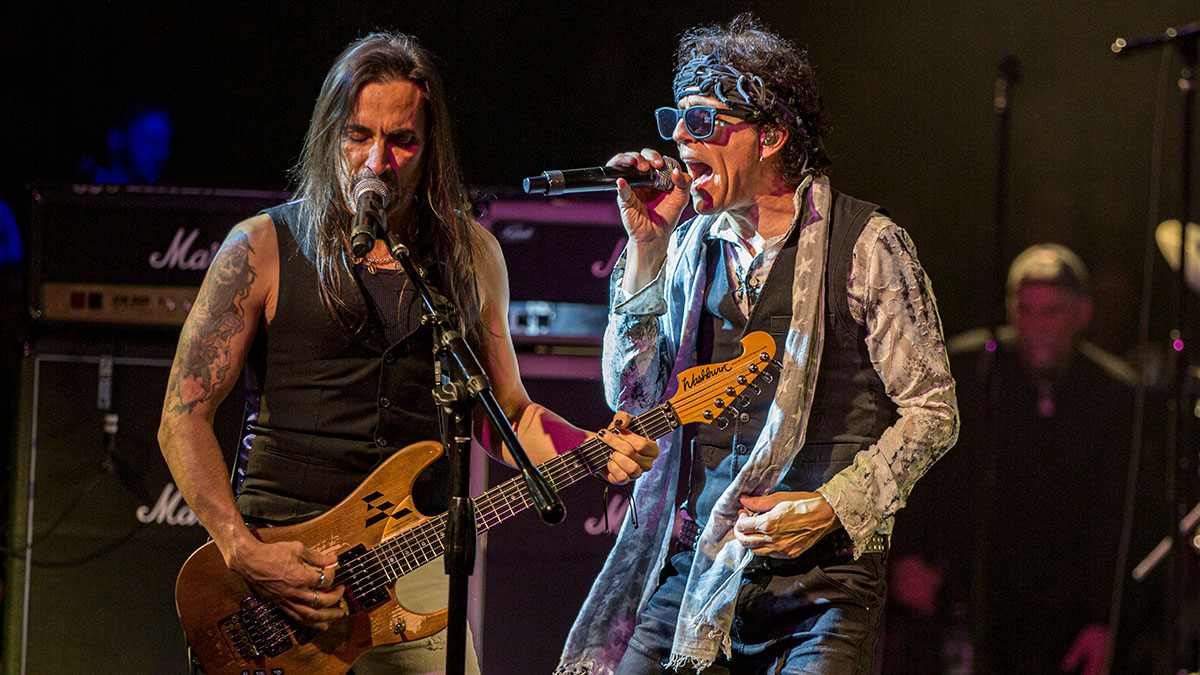
Because all this is not a technical exercise. It's like what you said about Rise, and why people reacted the way they did to it.
“I got together with a bunch of my friends – Tom Morello and Steve Vai, and DB Weiss from Game Of Thrones – and we are sitting there in the studio, and I caught a couple of people fucking tearing up during Hurricane. That’s what a producer does, meaning sometimes I am singing a few lyrics on there and it’s not the best vocal but, man, I was like, ‘Okay, I nailed that.’ Not technically, not pitch, but I was cracking. It was hard to sing because it was about my best friend who passed away.”
I used an N7 7-string for X Out for the first time in my f**king life! The first time in my life that I was using a 7-string.
We’ve got to ask you a bit about the gear. You found your thrill early on with the N4 and nothing’s changed there, but did you use anything different this time out?
“When it comes to gear, anyone who has talked to me over the years knows I am boring as fuck. I am a creature of habit. I have my Rat pedal filtering things out. I have the Marshall DSL [JCM] 2000. When people go get a DSL they’re like, ‘Are you fucking kidding me? A fucking DSL. The thing sounds like shit usually.’
“Whatever. A lot of people tell me that. But when you have the treble at two, and you have the midrange at two, and then you have the bass at four and the presence at two, and you turn it way up, that’s what that is. Whatever that is, to me, that is the key to it.
“I used the Nele for Small Town Beautiful, some places where you can tell it is a little bit of a different tone, a Tele/Nele tone, and that’s it, man. I used an N7 7-string for X Out for the first time in my fucking life! The first time in my life that I was using a 7-string.”
Now, that’s a cool track with a cool riff. Extreme has this internal logic that makes nothing off limits. You listen to that, and then you have Beautiful Girls, and it makes me think of David Byrne’s Something Wild soundtrack. It’s like anything goes.
“Someone asked me recently, ‘Man, y’know, Rise is different.’ I go, ‘Yeah, it’s an Extreme album. It’s expect the unexpected.’ We don’t do it to be different. What we do is, whatever fucking time we are doing an album, we are in a bubble and we are doing what we love, and it is as simple as that.
An Extreme album is an Extreme album. You’ve got to stay true to yourself and do what you do, like Queen. We are not like Queen, but we are a lot like Queen philosophically
“We are not trying to do what’s happening now. We might be influenced by what’s happening now. We were influenced by what happened in the ‘90s. We were influenced by what we are always influenced by. But I’ve never sat down to write a song, like X Out, and it’s going to be something, and it’s gonna do this. Or I am going to write a song like Hurricane. Every day you write selfishly, self-centredly.
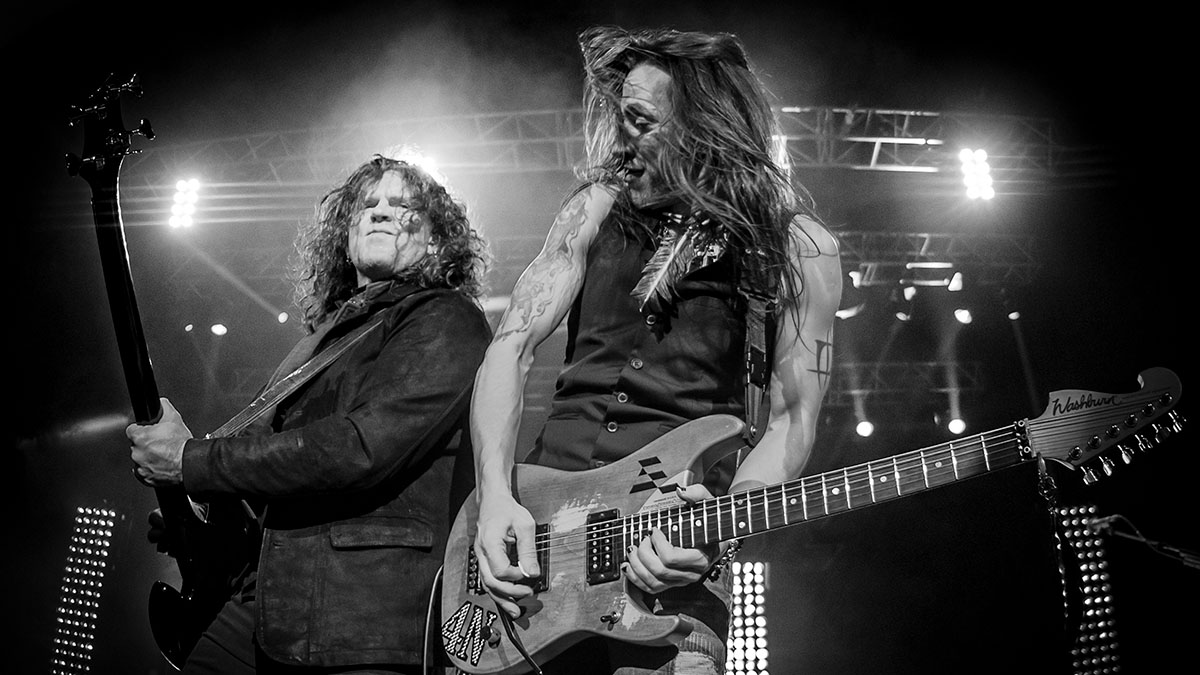
“Write what you want and then you pick the best fucking songs you have for the album, and that’s it. Sometimes you’re like, ‘Oh fuck! Beautiful Girls, what the fuck!? Okay!’ But every song you hear on the album – say, it’s Rise – and it is a heavy song, there are three or four other heavy ones that are fighting for that position, and we go, ‘Fuck, we can’t take that off. That’s the song.’ And two, three, four, five, six, seven songs that are fighting for those two positions.
“We pick the songs we think are the best. It’s as simple as that, and they are so different, and they are so whatever, but we don’t give a fuck. We don’t give a fuck! An Extreme album is an Extreme album. You’ve got to stay true to yourself and do what you do, like Queen. We are not like Queen, but we are a lot like Queen philosophically.”
Well, speaking of Queen, you do finish the album with We Are The Champions in reverse. Here’s To The Losers, indeed!
“Here’s To The Losers, it’s an anthem. We need an anthem for… Crystal Palace! [Laughs].”
- Rise is available to preorder and is out 9 June through earMusic.
Jonathan Horsley has been writing about guitars and guitar culture since 2005, playing them since 1990, and regularly contributes to MusicRadar, Total Guitar and Guitar World. He uses Jazz III nylon picks, 10s during the week, 9s at the weekend, and shamefully still struggles with rhythm figure one of Van Halen’s Panama.
"Reggae is more freeform than the blues. But more important, reggae is for everyone": Bob Marley and the Wailers' Catch a Fire, track-by-track
“Part of a beautiful American tradition”: A music theory expert explains the country roots of Beyoncé’s Texas Hold ‘Em, and why it also owes a debt to the blues










